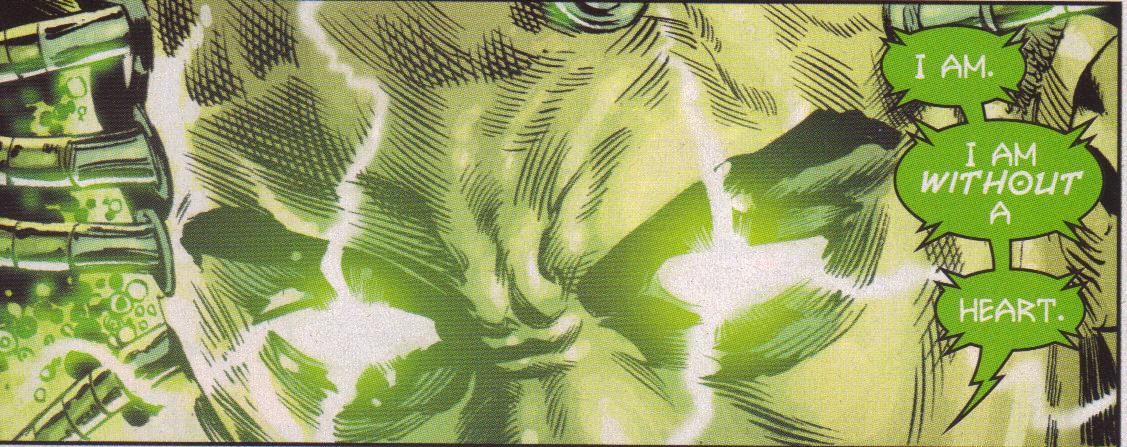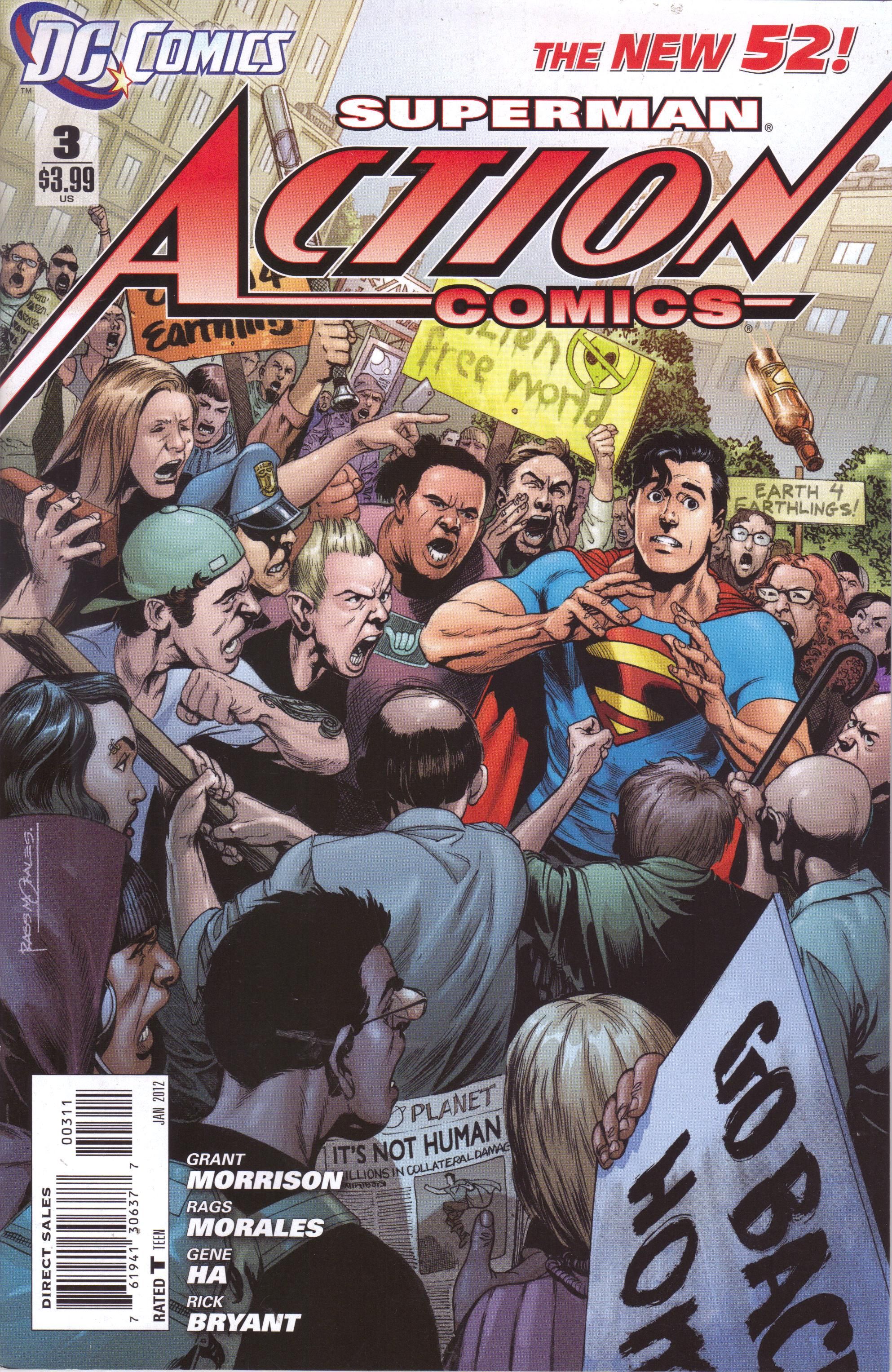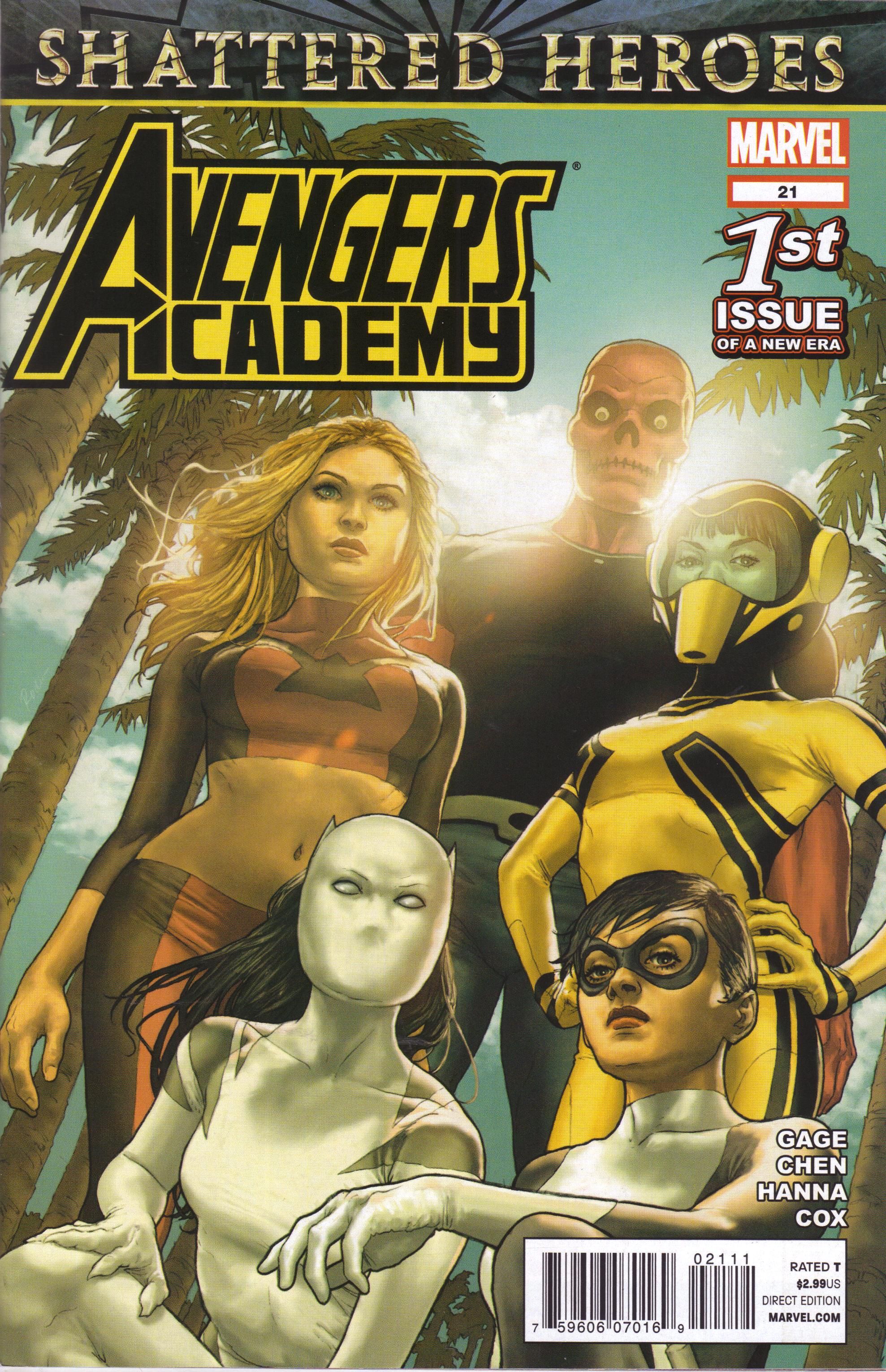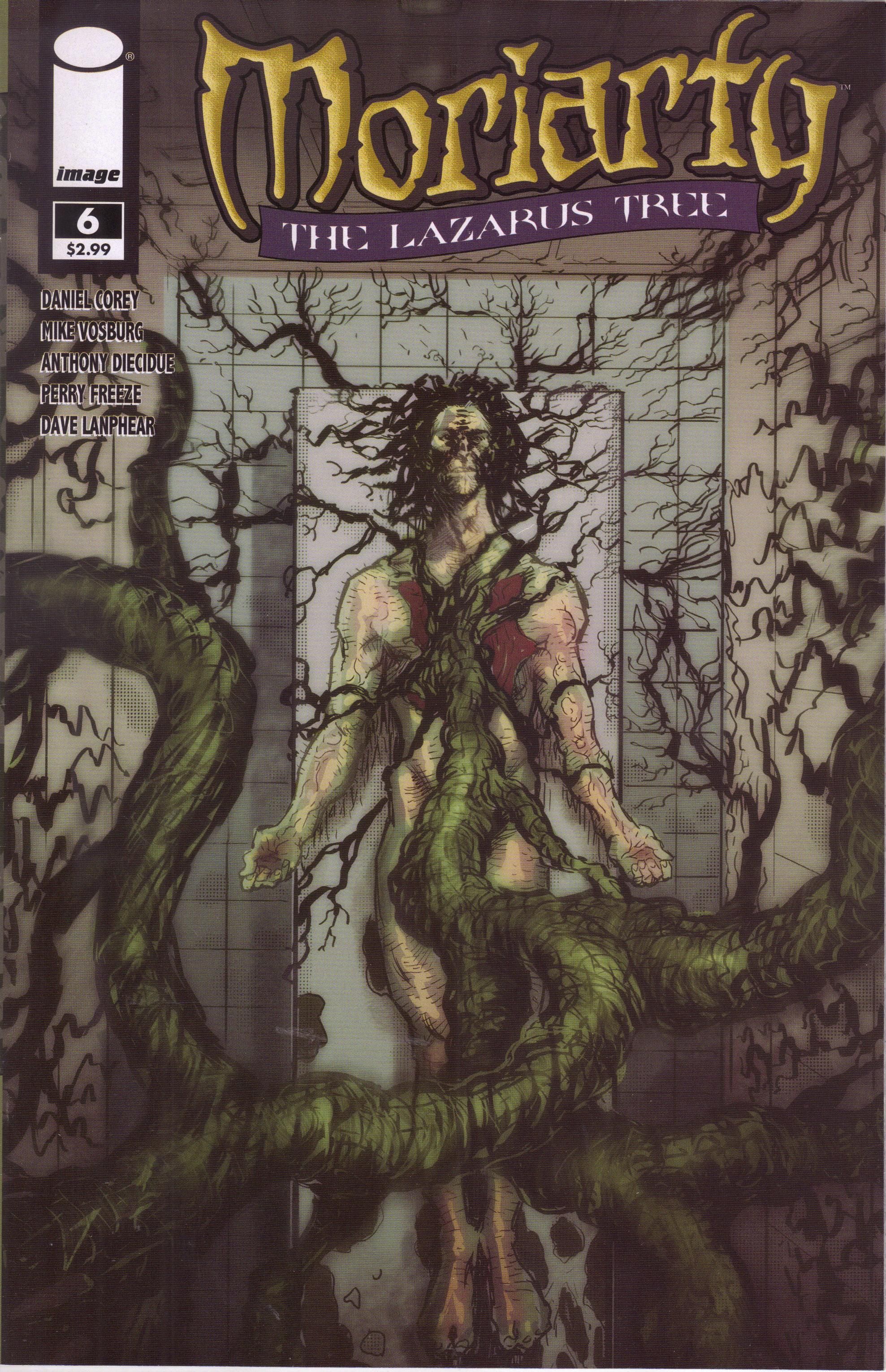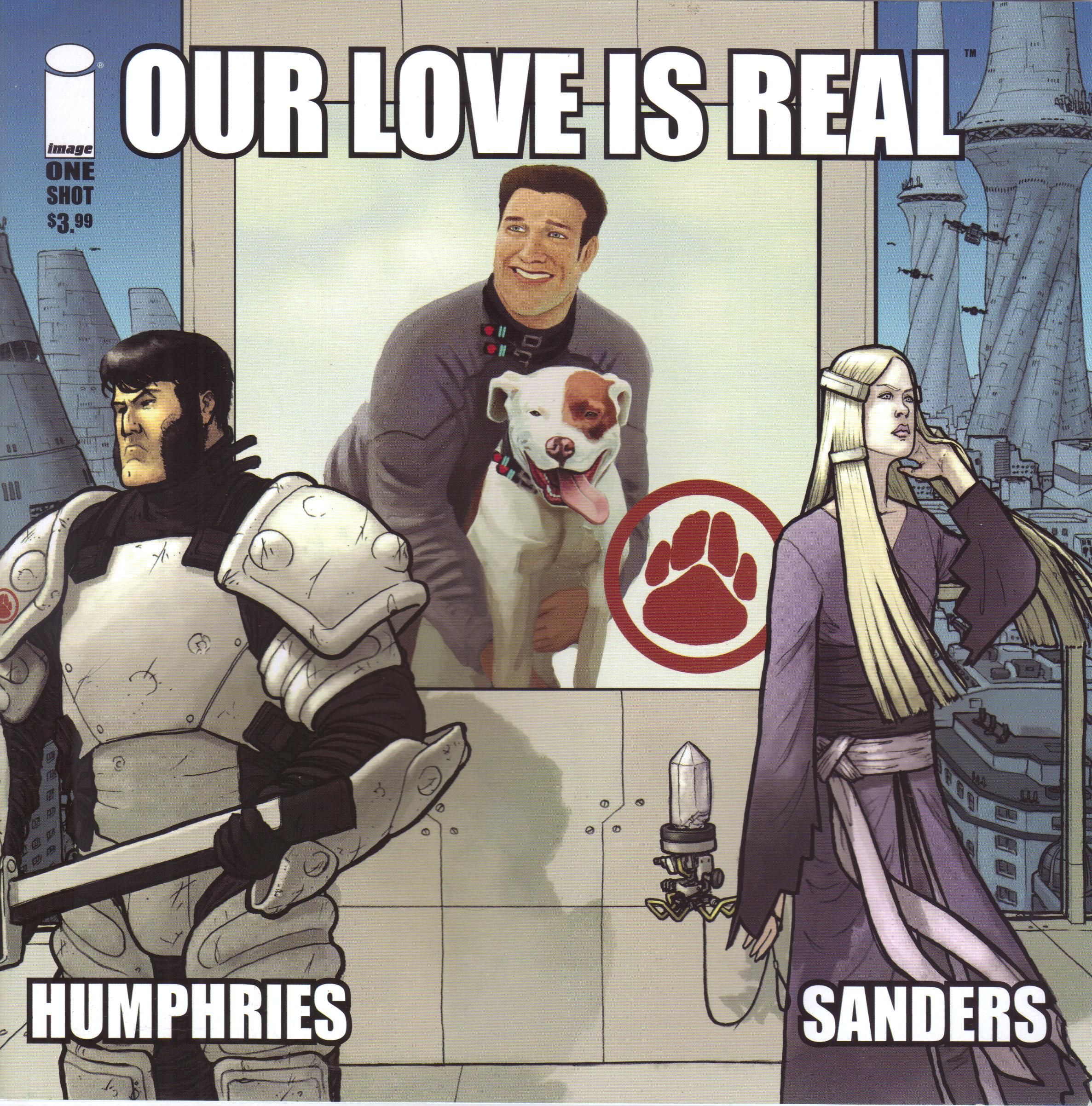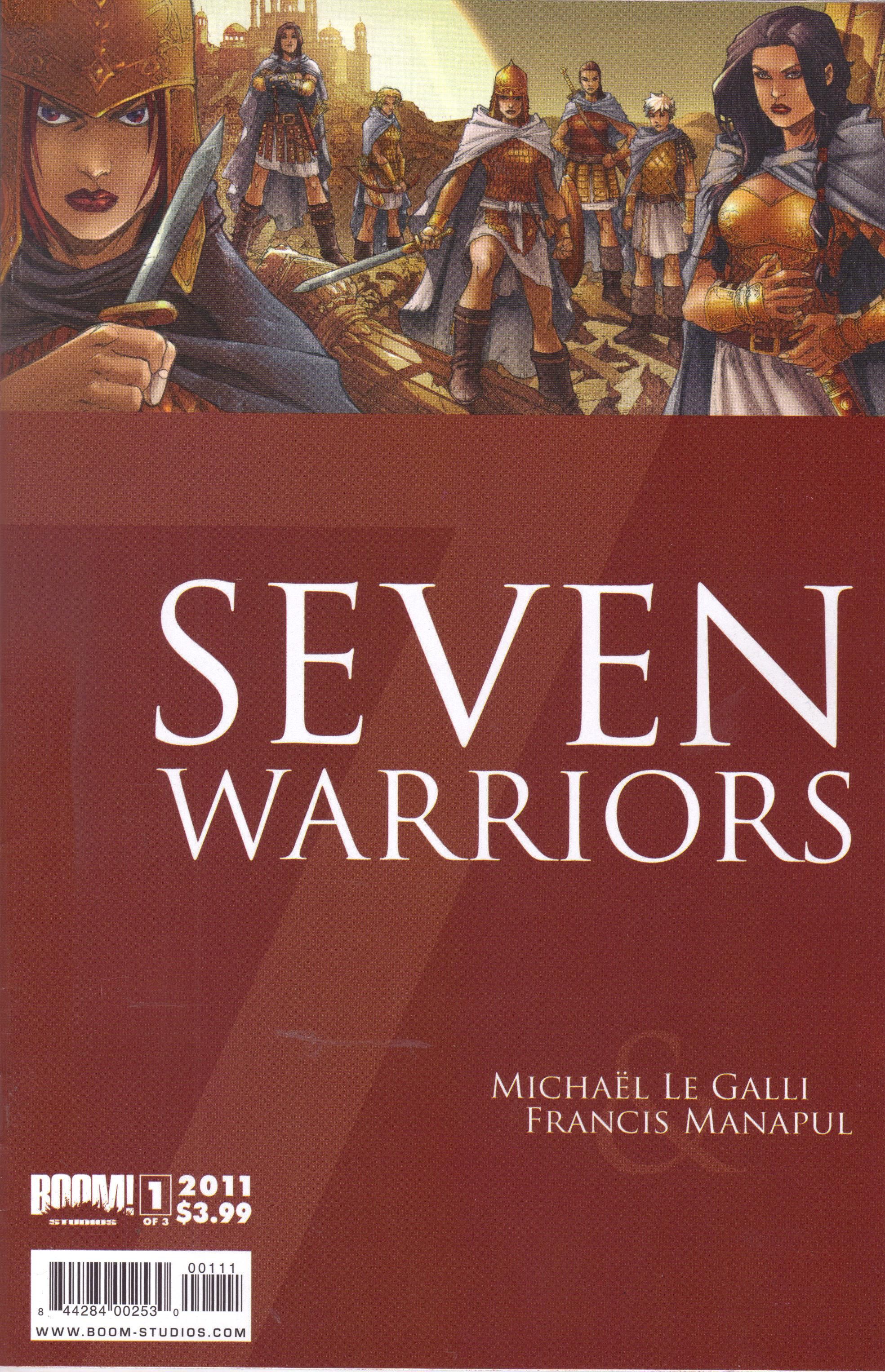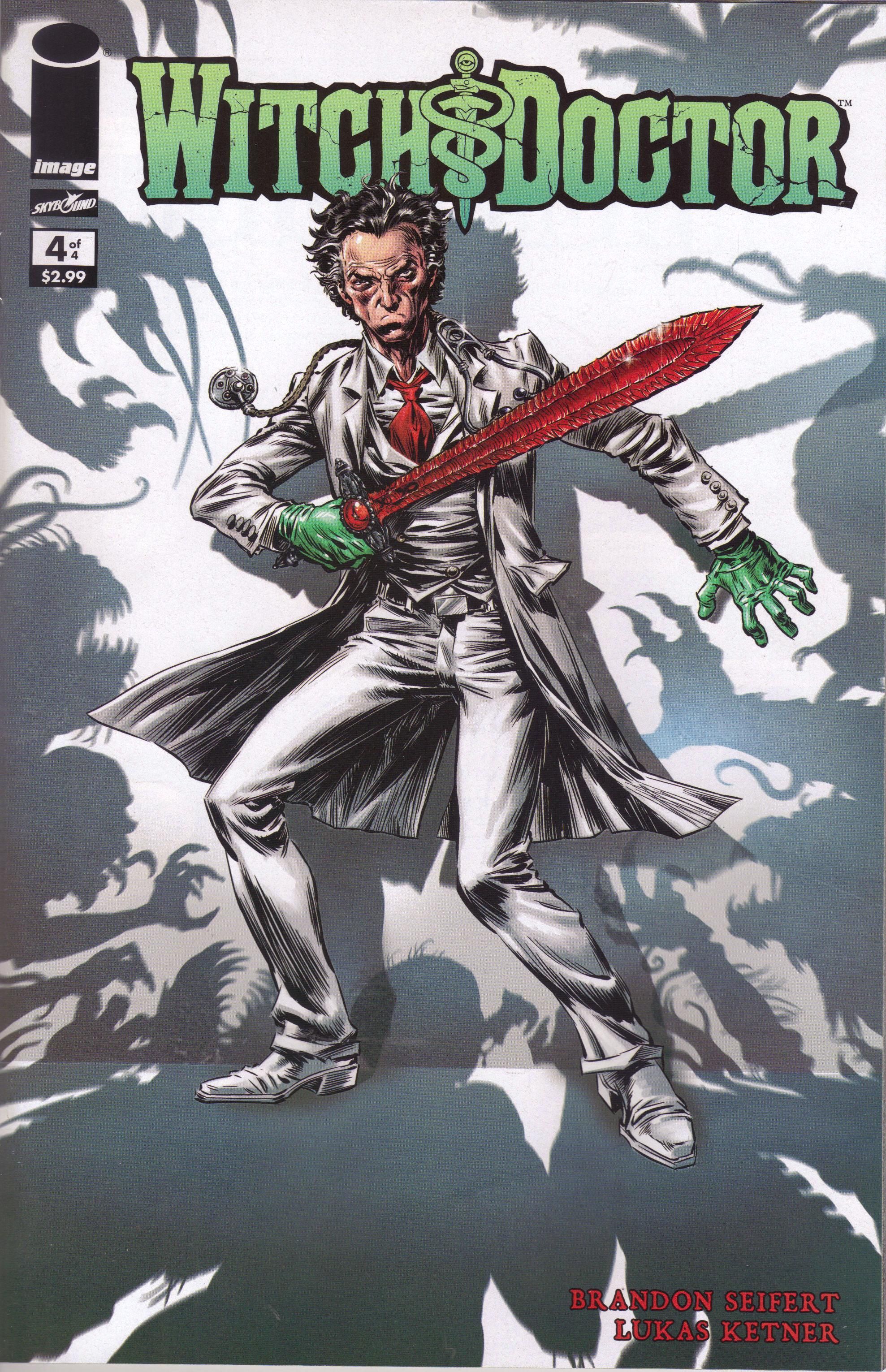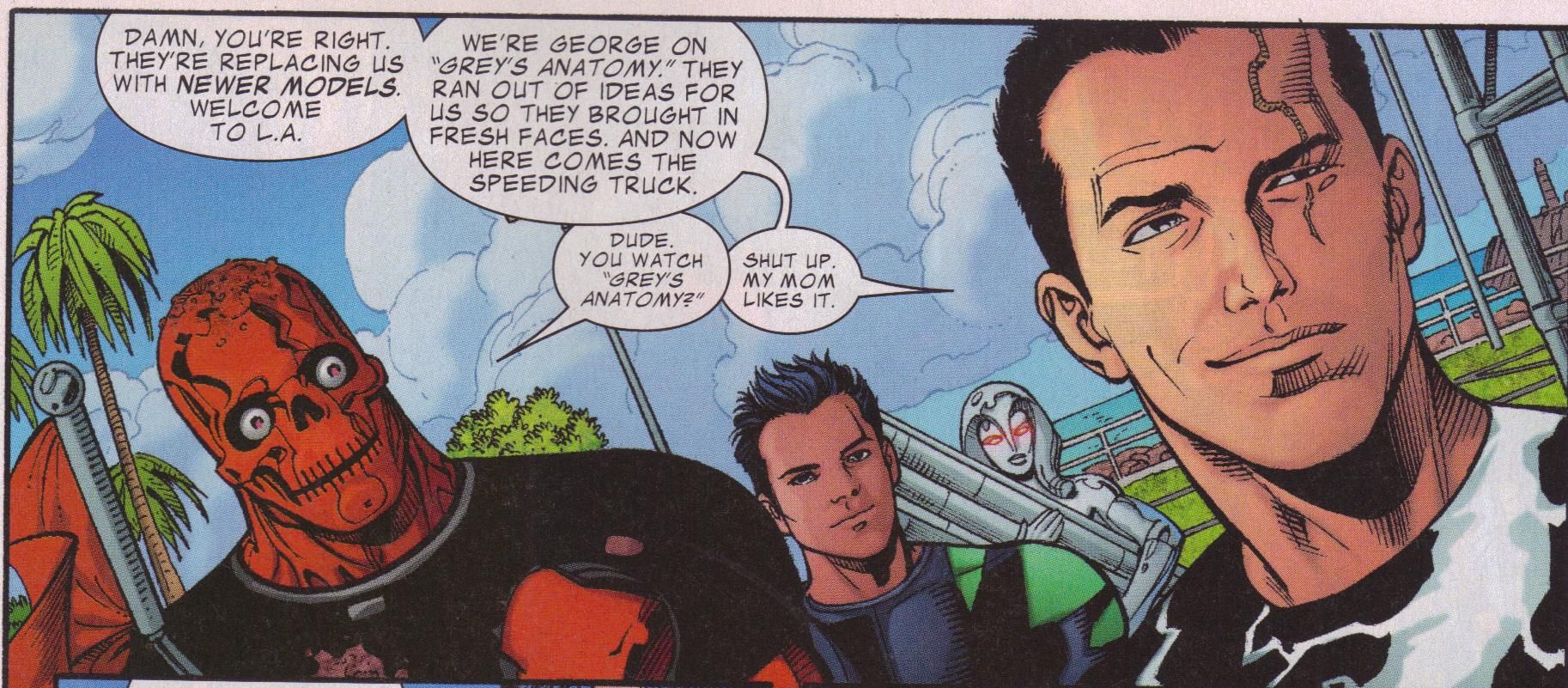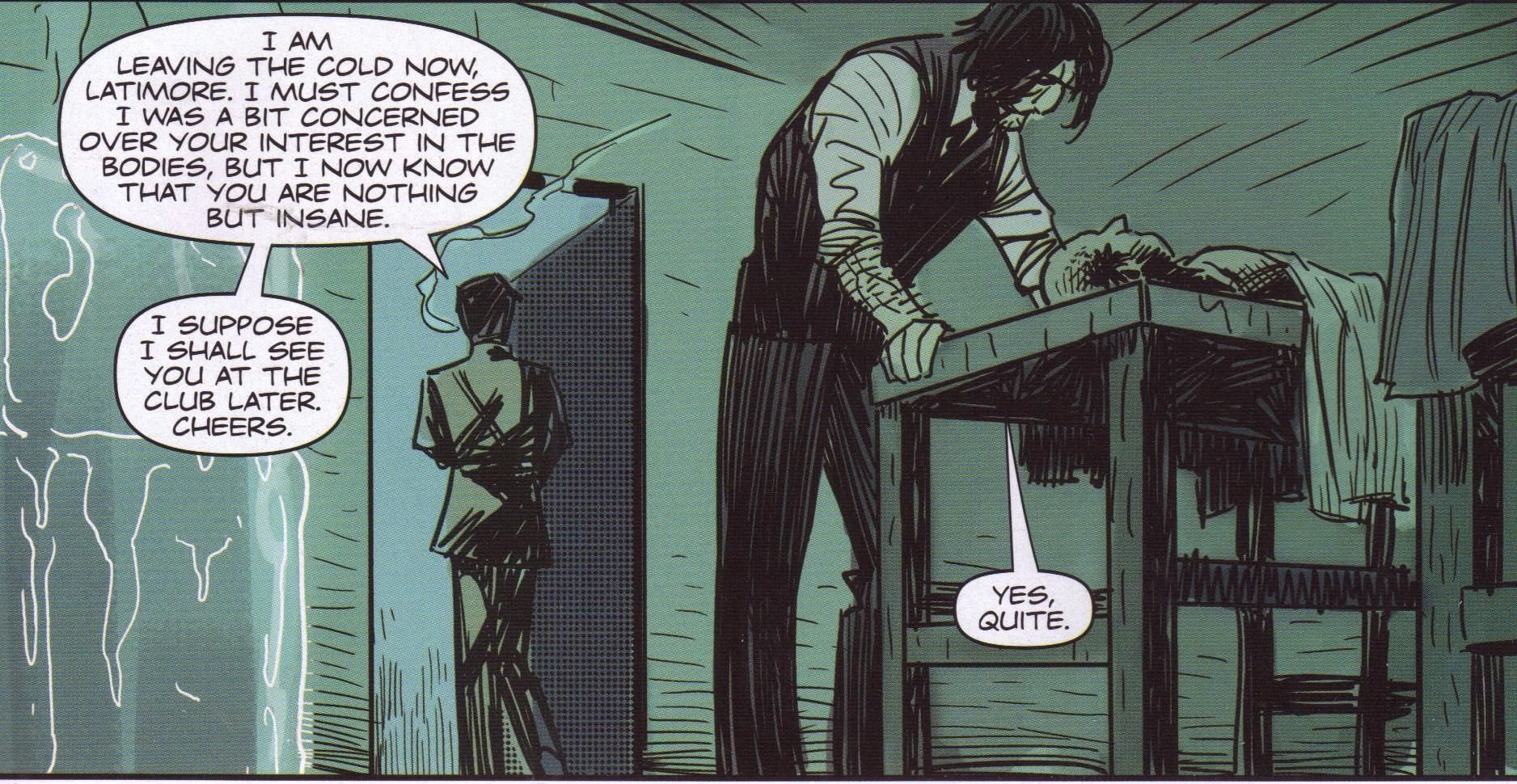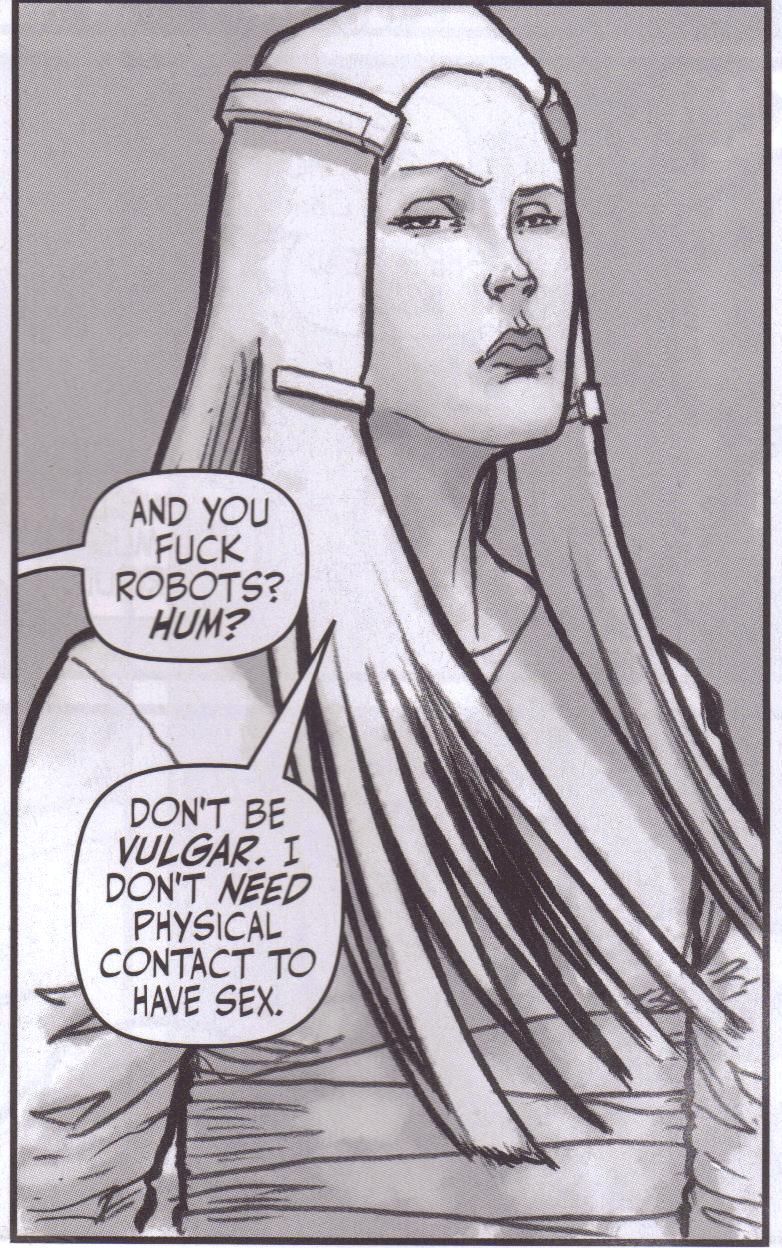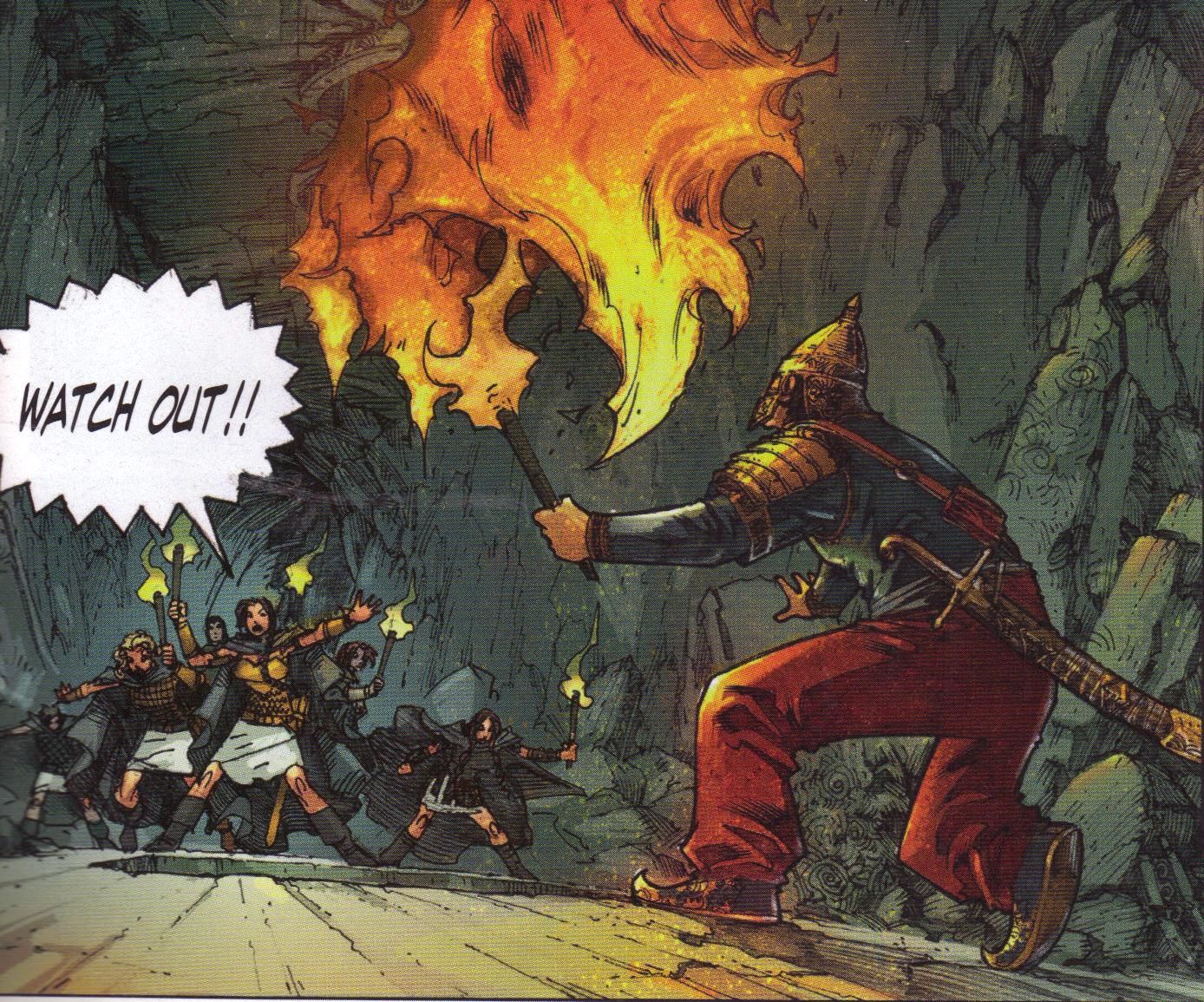All art is quite useless. (Oscar Wilde, from The Picture of Dorian Gray)
Not a lot of comics this week, so you know what that means! My mind tends to wander, so look out below!
Action Comics #3 ("World Against Superman") by Grant "Terminauts, fanboys - you love 'em!" Morrison (writer), Rags Morales (penciller), Gene Ha (artist), Rick Bryant (inker, Morales's pencils), Brad Anderson (colorist), Art Lyon (colorist), and Patrick Brosseau (letterer). $3.99, 20 pgs, FC, DC.
Man. This is a dull comic. I mentioned that last issue, and I wrote that I'd give it one more issue, and this is it. Man. I read the solicits for the upcoming issues, and it sounds like the God of All Comics has a really long-term plan for this title, but usually when he has a long-term plan for a title, the individual issues are interesting, at least. After a high-octane first issue that wasn't great but got things off to a nice start, the past two issues have been really, really dull. The opening sequence, with Clark dreaming about the destruction of Krypton, is kind of neat, especially because Gene Ha does a nice job with it. I don't really like the idea of the Terminauts coming to harvest the planet's artifacts (why "artifact" and not "artefact"? go here!), but whatever. Krypton looks sterile and shiny, but also ultra-modern and not an absolutely terrible place to live. Morrison, however, seems to enjoy writing that section more - it's a bit crisper. It feels, when he gets to Clark Kent, he's deliberately reining himself in, and it doesn't seem like he either enjoys that or simply can't do it. This book is packed with dull clichés, and while an optimist would say Morrison will subvert them in future issues, this issue (and #2) is just deadly. Oh, the punk cop who might be crooked and hassles Clark even though he hasn't done anything? Yeah, he's here. The people who were once on Clark's "side" suddenly turning into xenophobic fools? You bet. Superman rescuing a goddamned motherfucking cat from a tree (cats can get their own dumb selves out of trees, you know) and getting bottles thrown at him because the people have turned against him? Of course! A return to John Corben, who somehow is so stupid that he thinks turning himself into a freakish robot will make Lois all wet in the panties? Mai oui! This is just boring. After the first couple of pages, I kept waiting for that weird spark that makes even the worst Morrison comics worthwhile to read. I never got to it. This is not the worst comic Morrison has ever written, but it's probably the most boring. Some of his Batman comics were dull, too, and it turned out pretty well in the end. But I've reached a point where I just don't want to spend 4 dollars for a few nice pages and 13 consecutive pages of amazingly dull crap. Morrison seems to run out of ideas about characters and move on. Maybe he used everything up on All Star Superman? I don't know. I don't care. I'm not buying this anymore.
**********
Speaking of Superman, I'm currently reading It's Superman! by Tom de Haven. I'm not quite two-thirds of the way through it, and it's pretty keen. It's far better than any Superman comic book I've ever read (I may be reading the wrong ones) because De Haven really digs into the time period and what makes Clark Kent tick. I know that prose novels can do a lot more in some areas than comics can, but reading it, I'm struck again how much I miss fixed time periods in comics. I miss the fact that Flash Thompson fought in Southeast Asia (I'm not sure if they ever said it was specifically Vietnam, but it may have been). I miss the fact that Ororo Munroe's parents were killed during the Suez crisis. I miss that Jean Grey and Misty Knight roomed together during the 1970s and starred in a kick-ass series where they fought crime and dressed like Pam Grier a lot (oh, wait - that series never happened, but I would love if it did, because it would be motherfucking awesome). De Haven sets the book during the 1930s, not surprisingly, and he does a really nice job showing how Clark came to feel the way he does, and while I don't want to start up again about how liberal or conservative modern farmers are, De Haven shows why Clark would turn into someone like Superman. I don't want comics to be as in-depth as this novel, because of the nature of the medium, but it's kind of a shame that we've lost some of this idea that superheroes exist in the "real world." Oh well.
De Haven does screw up something that is very odd. Lois goes to the Polo Grounds in the middle of the summer and sees a baseball game. The Giants defeat the Washington Senators. Those two teams played in different leagues, and therefore would never have played each other in the regular season in the 1930s. Interestingly, they did play in two World Series, including a classic in 1924 (the only time Walter Johnson got to win a Series), but this game is in 1937 in either July or August. It's an odd little mistake in an otherwise well-researched book.
Rating: ★ ★ ★ ★ ★ ☆ ☆ ☆ ☆ ☆
One totally Airwolf panel:
Avengers Academy #21 ("Welcome, Students") by Christos Gage (writer), Sean Chen (penciler), Scott Hanna (inker), Jeromy Cox (colorist), Veronica Gandini (colorist), and Joe Caramagna (letterer). $2.99, 20 pgs, FC, Marvel.
I like how this is issue #21, but Marvel slapped a big 1 on it because it's the "1st issue of a new era." Eras used to be major time periods. Now less than two years of a junior Avengers title is an "era." Avengers Academy is a really good superhero comic, but let's not get carried away or anything.
So up above I was lamenting the loss of "realism" in comics, and in this issue we have a weird nod toward it. Julie Power shows up in this issue (that's her on the cover with the blonde hair and the tiny top). Julie has aged at least 7 years since she debuted, yet, of course, no adults in the Marvel Universe ever get any older. I always find shit like that interesting.
Gage has moved the school to the West Coast and enrolled a bunch of new students, and the original students are wondering what their role will be. Because they're hormonal teenagers, they assume the worst and start throwing punches, which doesn't excuse the fact that the adults punch right back ('roid rage, maybe?), but who doesn't love a good hero-on-hero fight now and then? (Well, me, but I can live with it, I guess.) Gage is simply re-establishing the direction of the book and letting the readers know that the core group will remain the focus - with Julie and White Tiger acting as teaching aides. Of course, a new story starts up, as Jocasta thinks she can help the kids but something happens to her before she can act, and Reptil turns up someplace he really doesn't want to be. I always cringe when time travel rears its ugly head in a story, but as usual, if I trust the writer, I can live with it.
Gage has Chen's bland pencils this time around, with Tom Grummett's bland pencils coming on fairly soon as the new artist. None of the artists on this book have been bad, but none have been exactly top shelf, either, and Gage's interesting scripts are really carrying this book along. The writing is so strong that I've decided that as long as the artists don't screw anything up, I'll be fine. The artists on this book have been solid professionals, so they haven't screwed anything up. Yay, artists?
This is an intriguing beginning to the new direction. I don't know if Gage had something like this planned all along or if sales-wise, the book isn't doing well, but it's still a good superhero book with a lot of interesting characters and nice "moments" (Hazmat and Mettle getting ready to get freaky is one of them, because of why Hazmat doesn't go through with it). I don't think it's ever going to be the best comic around, but I enjoy it.
**********
I've written a little bit before about when I moved West, but I figured I'd do it again. I graduated from Penn State University in 1993 with an English degree and a History minor. With two useless areas of study like that, my job prospects were slim. I was dating a wonderful young lady whom I had met at the beginning of my senior year, and she had also graduated. She was thinking about going to graduate school at Lewis & Clark College in Portland, Oregon. Even if she decided not to go (she eventually didn't), she wanted desperately to leave Pottsville, Pennsylvania, where she grew up. She told me she was leaving whether I went with her or not. Having no prospects in southeastern Pennsylvania, I said sure. We both worked during the summer to save money, and in August, we hit the road. Three weeks later, after living in a tent almost every night (we stayed in a motel at Hays, Kansas, because that was the summer the Missouri and Mississippi flooded severely, and our camp site was washed out; we stayed with a college friend of my mother's in San Francisco), we arrived in Portland and stayed. We both got jobs, found an apartment, and spent eight blissful years in the Rose City (I married that wonderful young lady in 1994, and she's been regretting it ever since!). Eventually I went to grad school, at Portland State University, got a Master's in History, and started looking for a teaching job. Unfortunately, there weren't any good teaching jobs in Portland, but I found one in Phoenix. We don't like Phoenix, but we've been here for a decade.
We've been thinking about moving back to Pennsylvania so that the grandparents can be nearer to the kids, but my lovely wife has a very good job (I don't work, in case you're wondering, because I'm tremendously lazy) and she can't find a comparable one back East. Even so, I love living in the West. I don't know what it is, really. I love Pennsylvania and would be happy to live there, but there's something freeing about the West. It feels more wide open, more exciting, more full of possibilities. Even in a wasteland like Phoenix, it feels like you can accomplish anything, while back East, it feels like you're more bound to your past. I imagine people who move from the West to the East feel the same way, because it's all about getting away from your past, but you can't deny that the East, being older and more settled, feels more set in its ways. Both Portland and Phoenix feel like places where anything can happen, where people want to come and make something new, and even after living in the West for 18 years, it still feels that way. I may dislike Phoenix, but it still feels more confident than places back East. It's an interesting feeling. We want very much to move back to Portland (even though I've heard it's a bit down from its 1990s heyday), but we'll see. Whenever I go back to Pennsylvania, I love it because it's where I grew up and many of my good friends still live there, but it also feels like everything is set in concrete. I know it's not, but that's the way it feels. Plus, I love the fact that sporting events start earlier out here. College football at nine o'clock in the morning? Hell yeah!
Rating: ★ ★ ★ ★ ★ ★ ★ ☆ ☆ ☆
One totally Airwolf panel:
Moriarty #6 ("The Lazarus Tree Part Two") by Daniel Corey (writer), Anthony Diecidue (artist), Mike Vosburg (layouter), Perry Freeze (colorist), and Dave Lanphear (letterer). $2.99, 22 pgs, FC, Image.
Corey does a really nice job with this mystery - he thanks two different experts that he consulted for the issue, and the knowledge he imparts in this issue is quite interesting and helps heighten the weirdness. The strange corpses are explained - sort of - but there's other bizarre stuff going on, and by the end, we learn something about the dude he's looking for. Corey packs a lot of stuff into this issue, and he's doing a very nice job balancing a lot of talking and some action. We've seen infodumps not work in comics, but this isn't really that - Moriarty might talk a lot in this issue, but it's crucial information for the plot, so it works. You might think it works better in a trade because of the fact that not a lot "happens," but this is really fascinating writing, and it's very fun. Diecidue doesn't have a lot to do, but he's solid as ever. There's not much else to say, I suppose. This issue is all Corey's show, and he's totally up for it. And George Orwell gets some fun lines (see below), so that's always nifty, too. (As a commenter pointed out last issue, Orwell wasn't in Burma in 1914 - in fact he was eleven years old - so Corey is playing fast and loose with history, but I assume he decided to send Moriarty to Burma and thought there was no way he couldn't use Orwell even if the time didn't fit. Of course, the first arc took place in 1914, and this has not been pegged with a date even though it seems to follow closely on the heels of the first arc, so maybe Corey is implying it takes place a good deal of time after the first arc? Oh well. I don't lose sleep over it, but I thought I'd point it out.)
Anyway, Moriarty is a cool comic. Why not give it a look?
**********
Anyone who reads this blog knows I love history. I'm not sure why - my dad likes history, but he's a bit of a polymath, so it's certainly not his only interest or even his primary one (he's a killer computer programmer). My entire family is a bit more science-oriented, so why I should be more interested in the arts is a mystery. Anyway, I've always been fascinated by history, and find it curious that more people aren't. When I taught history, the kids would invariably say that it already happened, so who cares? That's the kind of attitude that gets us in trouble, especially when it comes to politics. My Master's degree was with a focus on medieval European history, because that's the part of history I dig the most. My work for my thesis was on the Merovingians, the dynasty that ruled France from c. AD 500-751. I first read about the Merovingians in conjunction with the fables of their bloodline descending from Jesus (IT'S ALL A HOAX, PEOPLE!!!!!), but the more I read, the more interesting they became. The Merovingians were derided and practically whitewashed from history by Charlemagne's biographer, Einhard, but in the past thirty years or so, the study of the time period has picked up and revealed a fascinating dynasty. If you're in Portland, I'm sure my fascinating thesis is in the PSU library - you won't want to miss it! I translated the seventh-century Church councils into English (for the first time, I think) and drew conclusions about Merovingian society from them. Oh, it's a page-turner, all right! I'll tell you how gripping it is - my parents and my wife have never actually read my thesis, and they profess to love me. Yes, the lassitude they experience when they try to read it is stronger than love!!!!!
I enjoy other parts of history, naturally, and read books on all sorts of subjects. In the past few months I've read some novels, a few sports books, a biography of Moe Berg (an American League catcher who became an OSS agent during World War II), and history books: The Rogue Republic: How Would-Be Patriots Waged the Shortest Revolution in American History by William C. Davis, which is about the westernmost parishes of Spanish Florida breaking off from the mother country in 1810 and forming a short-lived republic which the rebels hoped would be (and eventually was) annexed by the United States; Batavia's Graveyard: The True Story of the Mad Heretic Who Led History's Bloodiest Mutiny by Mike Dash, which is about the wreck a Dutch ship off Western Australia (on the Houtman Abrolhos) in 1629 and the horrific events that followed; The Great Cat Massacre and Other Episodes in French Cultural History by Robert Darnton, which examines several events and writings from 17th- and 18th-century France that illuminates how people from that time viewed the world; Tycoon's War: How Cornelius Vanderbilt Invaded a Country to Overthrow America's Most Famous Military Adventurer by Stephen Dando-Collins, a book about William Walker, who became president of Nicaragua in the 1850s but pissed off Vanderbilt, who managed to get rid of him; Don't Tread On Me: A 400-Year History of America at War, From Indian Fighting to Terrorist Hunting by H. W. Crocker III, which is a highly jingoistic view of war but still manages to be extremely informative and thought-provoking until the author reaches the wars of the 1990s and beyond, where he simply becomes a Republican hawk; and Empires of the Seas: The Siege of Malta, the Battle of Lepanto, and the Contest for the Center of the World by Roger Crowley, a story of Suleiman the Magnificent's attempts to destroy Christendom in the Mediterranean in the mid-16th century and the Europeans' attempts to stop him. All of these books are popular history, to be sure (with the possible exception of Darnton's book), and occasionally their historiography is suspect, but they do illuminate very interesting parts of history that you might not know about. Darnton's book is the best, because he writes a social history about how differently people thought and viewed the world 300 years ago, even if we feel a certain kinship to them. It's one reason why I like Northlanders so much - Brian Wood's characters use modern language, which some have criticized about the book, but the way the people act feels more real than, say, in the first issue of Demon Knights, where it seemed like the characters were simply dressing up for a Renaissance Fair. History is fascinating because it shows us not only what happened, but why it happened. It's something people would do well to remember.
Rating: ★ ★ ★ ★ ★ ★ ★ ½ ☆ ☆
One totally Airwolf panel:
Our Love Is Real by Sam Humphries (writer), Steven Sanders (artist), and Troy Peteri (letterer). $3.99, 24 pgs, BW, Image.
Our Love Is Real is apparently controversial, though why I can't tell. Humphries and Sanders give us a world in the future, "five years after the AIDS vaccine," in which people love and have sex with all sorts of things. A cop, Jok, is having fun crushing a "vegisexual" riot - people who have sex with vegetables - when he meets Brin, a "mineralsexual" - people who merge their auras with crystals to have sex. Jok himself has sex with dogs, and he thinks his love is real, of course - she's a "living mammal," not something sick like vegetables or minerals. Of course, over the course of the book, Jok becomes obsessed with Brin, and even considers having sex with her ... a human! Yuck!
Of course, the very thoughts of having sex with dogs and vegetables is why this might stir up some controversy, but they're just words. Sanders doesn't show anything - the closest he gets is when Jok is lying in bed with Chyna, his "bitch," sitting on his chest, but if showing a dog sitting on someone's chest is objectionable, we're a lot more hung up as a culture than I thought we were. It's just the concept that icks people out, I guess, but of course Humphries is simply satirizing people who claim "their love is real" while denegrating anyone else's ideas of love. It's a simplistic tale, ultimately goofy (Jok's fate is clever, I guess, but not surprising), but Sanders does a nice job with the rough black-and-white pencils, and what Humphries's story lacks in piercing social commentary it makes up for in nice characterization in only a few pages. It's not a terrible comic, but there's no reason to seek it out just because of any controversy, either.
**********
History ties into politics, and I'm far more interested in history than politics, because I'm sick of politics. It's not just that I'm cynical (I am), because I've long ago decided that everyone who goes into politics is corrupt, it's that it makes people crazy. I'm more liberal than conservative, but I also agree with some conservative precepts and disagree with some liberal precepts. The funny thing about politics is that it's completely subjective, yet everyone thinks they're right and it's inconceivable that everyone can't see that. There is no right answer in politics, yet politicians (and partisans) think there is, and that makes everyone crazy. Is it any worse than it used to be? I doubt it. Partisanship was so bad 150 years ago that we had a bloody war over it, remember. What bugs me is that people seem to be unable to see the other side. I have a lot of sympathy for the Occupy Wall Street folk, but when they start talking about getting rid of capitalism, I chuckle. Perhaps they'd like to live in Soviet Russia for a while and see how they like it? I laugh when conservatives talk about Obama's taxes crippling their businesses, because if Bush's tax cuts are so wonderful, why has the economy gone in the tank over the past decade? Businesses whine about regulations and taxes and yearn for the days of yore, when they could, you know, employ children and demand 18-hour work days. I've read some history books about the Progressives in the early 20th century trying to reform business, and it's hilarious how the plutocrats back then whined that they would be driven out of business. Yeah, that didn't happen. Everyone complained about Bush's adventure in Iraq, and I was against the war, but at the same time, I realized that we can't give a verdict on Iraq for another decade or two. Will liberals admit they were wrong about the war if Iraq becomes a beacon of democracy? I doubt it. Politicians never admit they're wrong these days, and it's annoying. Conservatives who love the Tea Party rallies are terrified of the Occupy Wall Street rallies, and vice versa. Idiots. All of them.
The biggest problem is the speed with which things are communicated to everyone. Back in the day, things were as insane as they are now, but it took longer for everyone to find out, so they may have been reacting to something that was no longer relevant or they were reacting to something after emotions cooled. These days, everyone reacts immediately before they think, and things escalate. Nobody listens to the other side because their opinions have calcified. They have decided on their responses before they even listen to arguments of the other side. I have no problem if you reject the arguments of the other side, but it's annoying when people spout the party line and refuse to accept that things might be a bit more complicated than their opinions allow. There's also a stunning lack of responsibility from politicians when it comes to saying things. The best part of The Daily Show is when Stewart shows politicians on camera saying the exact opposite of something they said months or years ago. Sure, people change their minds, but no one in the media ever asks them about it. My lovely wife works for Bank of America, and while she doesn't particularly like working there, she also defends them from idiots. When B of A said they were going to charge people a debit card fee (which I had no problem with, even though I use one - banks have all sorts of hidden fees, so at least this one was out in the open), Senator Dick Durbin told customers to leave B of A. It was, of course, Durbin's amendment that capped fees the bank could charge merchants for use of a debit card that led to B of A charging consumers. So he doesn't want the bank to charge merchants OR consumers for debit card usage, even though it costs the bank to process those transactions? I get that people don't care because B of A is making a lot of money and they should just do things for free, but Dick Durbin is an idiot. Not to mention that all these people who are pissed at B of A because of the foreclosure mess fail to realize that the government begged B of A, as one of the few stable financial institutions in the country, to accept all the toxic mortgages that others were handing out and sift through them (that's part of my wife's job). Bank of America is, of course, a horrible corporate entity that only cares about giving their executives huge bonuses - I get that. But it's also true that the mortgage crisis might have been a lot worse if B of A didn't step in. See? It's complicated.
So, politics. Yeah. Blech.
Rating: ★ ★ ★ ★ ★ ½ ☆ ☆ ☆ ☆
One totally Airwolf panel:
Seven Warriors #1 (of 3) by Michaël Le Galli (writer), Francis Manapul (artist), Christelle Moulart (colorist), Edward Gauvin (translator), and Deron Bennett (letterer). $3.99, 22 pgs, FC, Boom! Studios.
I'm a bit puzzled by these foreign reprints, because the art always looks smaller than it should be. I imagine the original artwork is larger, but are the dimensions of the book so out-of-whack that the American publishers need to resize the art? If so, that's just another reason to break down the format by which we read comics.
Anyway, Boom! brings us this comic, a French comic that had to come out a few years ago because of the difference in style with Francis Manapul's current output. A few years ago, as I've mentioned recently, I read an issue of Manapul's Iron and the Maiden and absolutely hated the art, but either he or the writer came by and mentioned that Aspen liked a certain house style, so they tailored the art a bit to that. This art is more reminiscent of that than his current work, as he uses a much harder line and his characters are much less distinctive, but it's still fine artwork. Manapul shows that he has a good sense of grandeur with some of the longer shots, and his characters wear very detailed and historically accurate clothing, which is always nice. I do wish we could see the artwork in a bigger format, because as cramped as it is, it's a bit hard to read (especially because the word balloons are often too big), but there's nothing wrong with the actual work.
Le Galli tells a story about a medieval kingdom called Tamasheq (which is fictional, although "Tamasheq" is another word for Tuareg, a Berber language spoken in western Africa, and one review claims the book is in Libya, although how the reviewer knows that is beyond me), which is beset by unlikely allies, the Byzantines and the Persians (the Greeks and Persians were traditional enemies, and this probably dates this to before AD 632, when the Muslims came along and started wiping out the empires of the Middle East, because after that the Persians were no longer a threat to the Byzantines). The queen calls together a group of mercenaries to defend her kingdom, and she entrusts the safety of her son and heir, Aksamon, to a group of female Sarmatians who are to spirit him out of the city to a secret hideout. He, of course, doesn't want to go, and the queen doesn't seem completely trustworthy, but the book ends with the warriors (there are seven of them, but their leader stays behind in the city) heading through the underground tunnels that lead away and facing all sorts of danger. It's all very thrilling, if not exactly historically accurate.
There's not much to say about this issue, because it's a lot of set up. We are introduced to the warriors, Aksamon finds out that at least two of them are lovers, one warrior dies, and other obstacles come up. The queen has a scheme, and we're not sure what it is (it's heavily implied that she drugs the warriors and then the prince has sex with them all in order to impregnate them, but we don't see any of that, so who knows). There's a sex scene on the first page (this is a European comic, so nudity is not a problem!), but we have no idea who's having sex or why it's important. There's a servant girl who wants to go with the prince but is rebuffed, and I imagine she'll be important in coming issues. It's a decent set up, and it looks good, but it's hard to judge the quality of the book until we see it all play out. I'm intrigued, at least, and that's always good. I'll just have to see what happens in the next two issues.
**********
Kelly, Sue, and Kelly Sue's thoughtful discussion about women in comics and the existence of a glass ceiling in the latest podcast was extremely interesting, and if you have two hours to kill, I'd advise you to go listen to it. Obviously, I agreed with some of what they said and disagreed with other stuff, but as I am not a woman (yes, some people have actually accused me of having a vagina, but Our Dread Lord and Master usually deletes those comments even though they crack me up), I can't really speak to the way they've been treated (especially Ms. DeConnick, as she's active in the field of comics at this moment). I think it was Kelly who brought the old "chicken and the egg" metaphor, which I think is a good one. None of them could point to a specific instance of someone denying work to a woman simply because she was a woman, and they spoke of the general attitude of the "boys' club" of comics. None of this is hard evidence, which makes it impossible to prove that editors and higher-ups don't want women working in comics because, let's face it, girls are icky. It's very hard to figure out, not that there aren't a lot of women working in comics (that's easy to see), but why. Is it because women don't read superhero comics? Kelly and Sue (along with Maddy, who wasn't there except in spirit) are examples of the fallacy of that thinking, but they both could easily fall into the trap of thinking that their anecdotal evidence equates to statistical evidence (they don't do this, of course, but they could). I could point to anecdotal evidence that women don't read superhero comics, but of course I could also point to anecdotal evidence that men don't, either, because the industry is just so small. Are there few women in comics because it's only recently that women have become interested in superhero comics, and therefore a lot of older women didn't grow up aspiring to create comics and only now are they beginning to get into it? Beats me. If that's the case, it stands to reason that women will continue to enter the field and begin to change the way comics are written and drawn, but perhaps right now there aren't enough of them. As the comics companies are ridiculously cheap and often ignorant, no one is doing any kind of research into who reads their product or who might read their product if it were more readily available. I can't speak to experience of women in comic book stores, but I know that the stores I often use (the one in Mesa and the one I visit when I'm in Pennsylvania) are very friendly to any customers, and the proprietor of the Pennsylvania store told me he makes a concerted effort to bring in more women. Still, comic book stores remain daunting to anyone who's new to comics, male or female, and DC and Marvel don't seem terribly concerned with getting their product out to new places (well, they are recently, but one wonders if it's too late). I don't know if women want to read superhero comics in large numbers, and I suspect that nobody does. That's where the "chicken or the egg" thing comes from - are superhero comics geared toward males because females don't read them, or do females not read them because they're too geared toward males? It's hard to tell.
Another point with larger societal implications is the way men and women view the world. I happened to read an article in the paper yesterday about a survey by More magazine which showed that 73% of the women surveyed would NOT apply for their boss's job (some of the numbers appear here, but not all of them). It appears that a lot of women are opting to balance work and raising kids instead of going all out in the corporate world. People are still wired into this idea that women are the caregivers and men are the breadwinners (I was reading a blog a few days ago where the writer, a father, was told by someone that he was "babysitting" his own daughter, even though no one has ever dared say that to his wife), and might that seep into the corporate comics culture as well, even though it's far more "freelance" than a corporate structure? As I wrote, my wife is the breadwinner in the family, and if I can avoid having a job ever again, I'll take that (I enjoyed teaching, but it's not as much fun as sitting on my ass all day while the kids are at school!). I think the culture is changing and men are staying home and caring for kids while women work or both men and women choosing to hold jobs that are less stressful so they can still have a life is not as wacky as it used to be, but women working in comics are dealing with a larger issue than whether some asshole editor is stuck in the 1950s. Unfortunately for them.
This is a tough topic, and I hope Kelly and Sue continue to discuss it, even if I wonder if any of their listeners roll their eyes at it when they start in on it again (I doubt it; people who roll their eyes at it probably don't listen to the podcast because, you know, the icky girls thing). It's the kind of thing that's germane to the culture at large - recently people have been wringing their hands because the number of black baseball players has plummeted, but nobody really says why this is a bad thing, especially if they have other options. The number of women in comics is an issue, but if the reason women don't enter comics is not because people are keeping them out but because they don't care to enter, it's really not that big a deal. I suspect that the culture will change, but perhaps not as much as Kelly and Sue might like, because as girls grow up, they will continue to enter the industry in increasing numbers, but maybe they won't write/draw superhero comics. There's really nothing wrong with that. Superhero comics, like pretty much everything else created by humans, have no right to exist. They exist because there's a desire for them. Comics companies might do a wise thing and try to entice more readers (I think it was Ms. DeConnick who said that for editors, a "new reader" means someone who already reads comics but is going to try a new title, which is an idiotic definition), but if they want to die, so be it. We as readers certainly aren't entitled to superhero comics, after all.
Rating: ★ ★ ★ ★ ★ ★ ★ ☆ ☆ ☆
One totally Airwolf panel:
Witch Doctor #4 (of 4) by Brandon Seifert (writer/letterer), Lukas Ketner (artist), and Andy Troy (colorist). $2.99, 22 pgs, FC, Image/Skybound.
Witch Doctor is one of the best mini-series of the year, and I hope the response, sales-wise, is enough for Seifert and Ketner to keep doing comics with Dr. Morrow for years to come. In terms of similarities, this is far more akin to Hellboy than Atomic Robo is (as was pointed out recently, Atomic Robo has many superficial similarities to Mignola's creation, but tonally, it's much different), but that's perfectly fine when the execution is as good as this. Seifert has managed to write a creepy and even scary horror comic that's downright hilarious, mainly because the characters are so well written - Dr. Morrow is a tremendous character, but he needs a straight man, and his assistant Eric Gast fills that role wonderfully. This issue wraps up the story of the weird fish-people and why they're acting the way they are, and Seifert gives us a fascinating and perfectly believable solution (it might be pseudo-science, but I like it when it's believable pseudo-science!). He also, of course, makes sure that the story doesn't exactly end - the creators are planning on doing a series of mini-series and one-shots with the character, so of course there needs to be an ongoing kind of subplot. I don't mind that, either - it will make the giant-sized omnibus (I'm thinking ahead!) more fun to read.
Ketner continues to dazzle with the art, as well. This is a thrilling issue with some nice fight scenes, and although Ketner showed us in earlier issues that he could do weirdness well, he shows some nice action chops this time around as well. It's a very cool-looking comic, and it makes Seifert's scripts crackle with even more energy, which is nice.
I don't know if you were waiting for the trade with this, but if you were, it will be out in December (the 14th, the same day as the new one-shot), and I encourage you to go get it. This is a wild, intense, fun, and eerie comic. You'll like it, I promise!
**********
Just for fun, here are some of my top five things in several categories.
My five favorite U.S. presidents:
1. Theodore Roosevelt (1901-1909). Roosevelt might not have always made the right move, but he was still awesome.
2. James Polk (1845-1849). Polk took no shit. Plus, he said he wouldn't run for re-election and he didn't ... because he had done everything he wanted to do in one goddamned term!
3. Franklin Roosevelt (1933-1945). No saint, but the right dude at the right time. Herbert Hoover, a great American, does get a bit too much blame, though.
4. Abraham Lincoln (1861-1865). Kind of obvious.
5. William Clinton (1993-2001). Totally smarmy, but given the performances of his two successors, obviously Clinton knew a lot about being a politician (hence at least some of the smarminess).
My five favorite English monarchs:
1. Henry II (1154-1189). More for his wife, the divine Eleanor of Aquitaine, but still.
2. Henry V (1413-1422). Not as great as Shakespeare thought, but still pretty impressive.
3. Stephen (1135-1154). A terrible king, true, but also a man in somewhat of an impossible situation.
4. Victoria (1837-1901). I just like Victorian England, and she was the embodiment of it.
5. Edward I (1272-1307). A hardcore asshole, but just what England needed after the feckless Henry III.
My five favorite historical figures who aren't listed above:
1. Dagobert II (king of Austrasia, 676-679). A Merovingian monarch who was exiled in the 650s and came back in the 670s only to be assassinated right before Christmas, 679. Very little is known about his life, but what is known sounds like a Robert Louis Stevenson novel.
2. Simon de Montfort, earl of Leicester (1208-1265). The story of Anglo-American liberty usually goes from Magna Carta to Cromwell to Hobbes and Locke to the Founding Fathers, but the Provisions of Oxford rarely get mentioned, even though they were far more radical and democratic (in a 13th-century kind of way) than Magna Carta. De Montfort spearheaded the creation of the Provisions and tried to enforce them; he was killed in battle by forces of Prince Edward, who became the asshole Edward I we all know and love!
3. Suleiman the Magnificent (1520-1566). The greatest Ottoman sultan did a lot of great things, but passing on his empire to someone competent wasn't one of them. His heir, Selim, is known as the "Sot" because he drank so much, and he started the empire down a long path of shoddy rule that didn't often correct itself. But Suleiman is neat.
4. Eleanor of Aquitaine, queen of France and later England (1122/1124?-1204). Here's some of what Eleanor did in her life: married the king of France when she was 15; went on crusade with him when she was 25; had the marriage annulled because her husband, Louis VI, was a turd (okay, that's my opinion, but he seems like one); cavorted with the Duke of Anjou, Henry, a man 12 years younger than she (she was the original cougar); married Henry and then became queen of England in 1154; encouraged her sons to rebel against her husband and was imprisoned for 16 years for her efforts; ruled as regent while her son, Richard, went off on crusade, and later negotiated his release from an Austrian dungeon (he's known as the Lion-Heart; you may have heard of him); outlived Richard and eight of her ten children and lived well into the reign of her other son, John; created an entire culture of "courtly love" in Poitiers, which eventually gave rise to Arthurian legends. What the hell have you done with you life, you slacker?
5. Basil II, Byzantine emperor (976-1025). Of all the many cool Byzantine emperors, Basil is my favorite. He has one of the best nicknames in history - the "Bulgar-Slayer." 'Nuff said!
My favorite albums, with no acts appearing more than once*:
1. Misplaced Childhood, Marillion (1985).
2. Duke, Genesis (1980).
3. Apple, Mother Love Bone (1990).
4. Hey Ma, James (2008).
5. Nothing's Shocking, Jane's Addiction (1988).
* This could change daily, if you must know, except for the first one, which has been my favorite album for over 20 years.
My favorite cities (to which I've actually been):
1. Portland, OR. I lived there for eight years (1993-2001) and had a blast. It's a smallish city but not too small, easily navigable both by car and by foot, and it has all sorts of quirky stuff, including cool movie theaters and great live theater and excellent restaurants. Plus, it's easy to get to the beach and the mountains and the Columbia Gorge, all of which are very keen.
2. Melbourne, Victoria. I studied abroad here from February-June 1992 at the University of Melbourne. It was an excellent experience and I encourage everyone to visit Oz once in their life. Melbourne is my kind of town (Sydney is cool but not as cool as Melbourne) - it's a bit weirder than Sydney, Adelaide, or Brisbane; it's more pedestrian-friendly than Sydney; it has a very cool trolley tram system (well, it did 18 years ago - I assume it's still there). I met a lot of cool people, drank a lot of good beer, and traveled all over the place, running up the credit card my mom was paying for (HA!). Plus, I was 20/21, and there were a lot of cute girls who thought American accents were neat. DO THE MATH! (I didn't have as much game as some of the other American dudes who were there, but still.)
3. Philadelphia, PA. I grew up in its suburbs, and I love going down into the city, especially recently, as it's experiencing a bit of a renaissance. I love the narrow streets and the cobblestones, South Street, the waterfront, the old buildings, the history - it's an underrated city and gets lost between Boston, New York, and Washington, but it's still pretty awesome.
4. Seattle, WA. I've never lived in Seattle, but I've been there more than a few times. It's sleeker than Portland, but it still has a lot of the Northwest quirkiness that makes the region such a cool place to live. It's in a gorgeous location, has underground tunnels running through the old section (you can tour them!), and the baseball stadium is really nice. It's a bit more expensive than Portland (or it used to be), but I wouldn't mind living there.
5. Paris, France. It's been 25 years since I've been in Paris, but I loved it when I visited there with my parents in 1985. I wouldn't want to live there because I don't speak French, but I still love it. I mean, it's Paris. Duh. (While I was there, I played a lot of table tennis with this young lady, and she tended to beat the snot out of me. She was a couple years older than I was and very athletic, which probably had something to do with it. It probably didn't help that I hadn't seen her since I was 8 years old and in that time, she got smokin' hot. I was kind of distracted, don't you know.)
My favorite movie scenes (which is much harder than my favorite movies):
1. Probably my favorite scene in a movie is in Mindwalk, after John Heard, Sam Waterston, and Liv Ullman have been discussing metaphysics and other heavy stuff for two hours as they stroll around Mont-St.-Michel. At the end of the day, Heard is angry because Ullman has come up with a way for the universe to work but she's forgotten the human element. He stands on the beach and recites Pablo Neruda's "Enigmas" and asks where the people are in her world view. It's a brilliant moment in an overlooked film, and it's stayed with me for years.
2. I like In the Name of the Father a lot, but I like it more when Emma Thompson is on screen, because she's awesome. The moment toward the end when she asks the judge why the testimony of the homeless guy who could have cleared Daniel Day-Lewis was not to be shown to the defense is excellent. The film builds well to that moment, but she pulls it off beautifully.
3. The Fisher King is one of my favorite movies, and when Robin Williams walks Amanda Plummer home from their first date, it's a great scene. She starts telling him what will happen when he asks to come up for coffee, and she's convincing herself that they'll sleep together but then he'll never call her, and he tells her he doesn't like coffee and all he wants is a good-night kiss. She gives him one, and he's as happy as he's been in years, and then the Black Knight shows up. Damn, it's a wonderful scene.
4. I have no idea how Adrian Lyne made Jacob's Ladder when all his other movies basically suck, but he did, and it's tremendous. The scene that absolutely freaks me out is when Tim Robbins is in the hospital and his ex-wife and kids show up and smother him with hugs and kisses. His ex-wife says eveything is going to be all right, and a growly, inhuman voice says "Fat chance" "Dream on" and Robbins turns, terrified, and looks directly into the camera. It's a horrifying scene because we know it's not going to be all right, and Lyne somehow makes us complicit in what Robbins is going through. Man.
5. There are a bunch of other scenes I could list, but I have to end with the end of Rambo: First Blood Part II. It's a terrible movie, but that ending ... man. Here's Sly and Richard Crenna (I can't find the full thing online, but you all know it anyway!):
Trautman: The war, the whole conflict, may have been wrong, but damn it, don't hate your country for it.
Rambo: Hate? I'd die for it.
Trautman: Then what is it you want?
Rambo: I want (pause), what they want (pause), and every other guy (pause), who came over here and spilled his guts (pause) and gave everything he had (pause), wants! For our country (pause) to love us (pause) as much as we (pause) love it! That's what I want! (He starts walking away)
Trautman: How will you live, John?
Rambo: Day by day.
Finally (because I could do this all day!), my favorite movies that you might not have seen or heard of (you guys are pretty clever, so I'm sure you've seen and/or heard of some or all of these, hence the use of "might"):
1. Hardware (1990). You scamps might actually have seen this, because it's based on a Kevin O'Neill 2000AD story. Dylan McDermott finds a robot head in a post-apocalyptic desert and brings it back to the city, where he gives it to Stacey Travis. Unfortunately, it's not quite out of juice yet, and it turns back on and wreaks havoc. Hardware is a surprisingly good-looking movie, given the low budget, and it's amazing how well the filmmakers made Jill's apartment seem so terrifying. Plus, Iggy Pop's voice is in the movie, and so is Lemmy. This has a great soundtrack, too.
2. A Pure Formality (1994). Gérard Depardieu and Roman Polanski star in an overlooked thriller in which Depardieu is a writer who is found wandering around suffering from short-term memory loss and Polanski a police inspector who's suspicious of him and thinks he might be guilty of murder. It's a tense, claustrophobic movie, with both leads giving amazing performances, and it has a nice twist at the end (which at least one of my friends figured out, but that's because he's always pulling shit like that).
3. Before the Rain (1994). This movie tells three separate stories that interconnect a little and loop back on each other - like Pulp Fiction, it's an impressive achievement of filmmaking. The stories themselves are excellent - they all concern the Balkan wars of the 1990s and how hard it is to escape the violence of centuries. It's a brutal but moving film, and the performances are all excellent. Rade Serbedzija, who often shows up in American movies as the Slavic bad guy, is very good, and the sublime Katrin Cartlidge gives a typically fantastic performance. This finally came out on DVD a few years ago, and I snapped it up!
4. The Princess and the Warrior (2000). After she burst on the scene with Run Lola Run and before she became Jason Bourne's Refrigerated Woman, Franka Potente made a second movie with Lola director Tom Tykwer, and this is it. It's a far more complex movie than Lola, as Potente plays a nurse who saves the life of a career criminal and then falls for him even though that might not be smart. It's almost a fairy tale, and the magic of it works well with the gritty reality. I like Run Lola Run, but this is far better.
5. Irma Vep (1996). I mentioned this movie on the blog a few weeks ago, and at least one commenter knew it! This is an odd movie starring one of my many actor crushes, Maggie Cheung, playing herself. She's starring in a remake of a 1915 French film about vampires (even though she speaks no French), but finds that fiction and reality start to collide a little bit. It's a darkly humorous movie, and Cheung spends a good portion of it in a catsuit, which really isn't a bad thing at all.
(I would have put Mindwalk on this list, but I already mentioned it. It's a great movie.)
All right, that's enough top five lists. Sorry, I got carried away!
Rating: ★ ★ ★ ★ ★ ★ ★ ★ ½ ☆
One totally Airwolf panel:
A couple of more fun things: Here is a pie chart showing the number of explosions in Michael Bay movies. It's kind of sad. There's also a graph that shows the gross in millions is almost perfectly correlated with the number of explosions in his movies. That's even sadder. Meanwhile, here is a Steven Seagal "movie word plot cloud," which is hilarious. What's your favorite Steven Seagal movie? Mine is Above the Law, because it stars the aforementioned Pam Grier (back before Quentin Tarantino "rediscovered" her), Sharon Stone before she became "Sharon Stone," and Henry Silva, who's a total bad-ass. It's basically a shit movie, but it's light-years better than the few other Steven Seagal movies I've seen, including Under Siege. My wife claims that Steven Seagal movies make her eyes bleed. I very much doubt this.
Yes, I'm still going to subject you to The Ten Most Recent Songs On My iPod (Which Is Always On Shuffle)!
1. "3121" - Prince (2006) "Butterflies scared that they're gonna be awake all night long"
2. "Woman Oh Woman" - Foreigner (1977) "I hope that you can see this is nothing like our love was meant to be"
3. "We're in This Together" - Nine Inch Nails (1999) "Well they've got to kill what we've found; well they've got to hate what they fear"
4. "Neighborhood #4 (7 Kettles)" - Arcade Fire (2004) "My eyes are covered by the hands of my unborn kids, but my heart keeps watchin' through the skin of my eyelids"
5. "Blister in the Sun" - Violent Femmes (1983) "I'm high as a kite, I just might stop to check you out"
6. "Muzzle" - Smashing Pumpkins (1995) "And the world so hard to understand is the world you can't live without"1
7. "Gimme Stitches" - Foo Fighters (1999) "I'll always be the one who runs from everyone 'cause everyone's just too weird"
8. "Bullet with Butterfly Wings" - Smashing Pumpkins (1995) "Now I'm naked, nothing but an animal, but can you fake it, for just one more show?"
9. "It's Gonna Get Better" - Genesis (1983) "In the darkness you feel the sharpness of steel"
10. "Christmas Wrapping" - Waitresses (1981) "Then suddenly we laughed and laughed, caught on to what was happening"2
1 I saw Smashing Pumpkins at Penn State in 1991 - they played with Pearl Jam and Red Hot Chili Peppers. Unbeknownst to me, my future wife was also at the show. Billy Corgan was a total dick. He was insulting the crowd and didn't seem into playing, and someone actually threw a shoe at him, which royally pissed him off. I didn't think throwing a shoe at him was very nice, but he was being a dick, so there's that.
2 Patty Donahue, the lead singer of the Waitresses, died in 1996 of lung cancer. She was 40. Some day society will realize the glory of the Waitresses, and once that happens, we will enter a Golden Age. Sadly, that hasn't occurred yet.
What? A Totally Random Movie Quote? In a post where I wrote A LOT about movies? Let's do it!
"Tell me something old buddy, do we kill our own senators now?"
"Why not? The Romans did."
"Are we the fucking Romans?"
"We're an empire too."
This week, instead of mentioned how much I want tags back, I'll point out that November is National Novel Writing Month, in case you want to give it a try. Our own Ms. Kelly Thompson is participating, so go to her blog and keep track of her progress! I tried doing this six years ago but didn't make it, sadly enough. Every year I think about doing it again, and this year I'll ask you if I should give it a try. I blogged the novel; here it is. If you have a few minutes, read a chapter or two and let me know if you think I should try to finish it or at least write some more of it (I never know where my writing is going; I don't plot things out beforehand). I won't be as committed to it as I should be, but I always have a blast writing, and I ought to do more of it. So let me know!
Man, that turned out to be a long post, didn't it? That's what happens when it's a small comics week - my mind goes elsewhere! Thanks for indulging me, and maybe next week I'll actually have more comics to write about!

